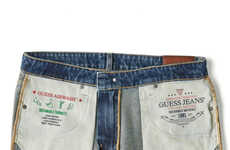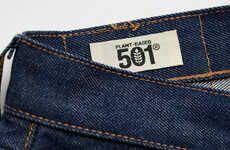
Jack&Jones Launched a 'Low Impact Denim' Collection
Riley von Niessen — April 6, 2018 — Eco
References: jackjones & fuckingyoung.es
Menswear label Jack&Jones recently debuted its Low Impact Denim collection, along with a lookbook that highlights some of the standout styles from the sustainability-focused series.
A total of four different styles are presented in the lookbook, which boast versatile light and medium washes. To create the styles, the brand used substantially less water, energy and bleaching agents that normally go into denim production. In addition, the jeans utilize a more sustainable mixture of polyester and cotton, which consists of recycled materials that're grown without the use of harmful pesticides and genetically modified seeds. Overall, the Low Impact Denim uses 55% less water.
The new collection is currently available from the Jack&Jones web and in-store locations, as well at participating retailers.
A total of four different styles are presented in the lookbook, which boast versatile light and medium washes. To create the styles, the brand used substantially less water, energy and bleaching agents that normally go into denim production. In addition, the jeans utilize a more sustainable mixture of polyester and cotton, which consists of recycled materials that're grown without the use of harmful pesticides and genetically modified seeds. Overall, the Low Impact Denim uses 55% less water.
The new collection is currently available from the Jack&Jones web and in-store locations, as well at participating retailers.
Trend Themes
1. Low Impact Denim - Opportunity to develop sustainable denim production processes by reducing water, energy and chemical usage while utilizing recycled materials.
2. Sustainable Fashion - Opportunity to create environmentally-friendly fashion collections using recycled and sustainable materials that benefit the planet.
3. Circular Economy - Opportunity to close the loop of fashion production by utilizing recycled materials and implementing circular production processes.
Industry Implications
1. Fashion - The fashion industry can benefit from developing sustainable and environmentally-friendly production processes, while meeting the growing demand for eco-conscious fashion.
2. Textile - The textile industry has the opportunity to shift towards more sustainable practices by utilizing recycled materials and implementing circular production processes.
3. Retail - The retail industry can offer eco-conscious consumers more sustainable fashion options by partnering with brands that have sustainable production processes and offering these collections in-store and online.
4.2
Score
Popularity
Activity
Freshness























